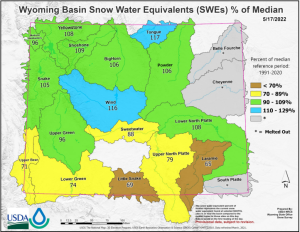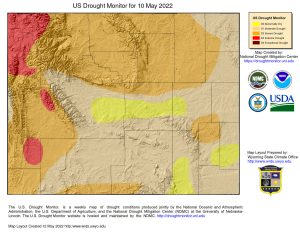Wyoming Snowpack Recovers & Lessens Drought Conditions
Written by Andrew-Rossi on May 18, 2022
April and May may have rained on peoples’ plans, but the wet weather was exactly what Wyoming needed, building snowpack closer to average amounts for this time of the year.
The Wyoming Natural Resources Conservation Service released another snowpack/snow water equivalent report – it’s the 23rd of the current water year. The “water year” is the 2021-2022 snow season.
Currently, Wyoming’s snowpack/S.W.E. is 74% of the median. It’s lower than it should be, but 74% places 2022 ahead of both 2020 (62%) and 2021 (63%) for this point of the year.
In Wyoming, every water basin benefitted from the late winter weather, lessening but not eliminating drought conditions.
As of May 17, no basin is below 65% of its median S.W.E. This is a definite improvement, considering many were much lower earlier in the season.
The state’s basins highest median snowpack is 117% in the Tongue Basin in north-central Wyoming. The state basin low is 65% in the Laramie Basin in Wyoming’s southeastern corner.
Most state basins range between 70% and 110% snowpack for the year.
Unfortunately, the influx of moisture won’t change the long-term forecast for 2022, which is calling for a hotter, drier summer.
Overall, Wyoming didn’t stay cold this winter. The frequent changes from frigid cold to unseasonably warm – especially in January, February, and March – deteriorated snowpack without adequately building it back up again.
The Wyoming Drought Monitor reports a significant portion of the state is experiencing a severe drought. That portion includes the entire Bighorn Basin.
Meanwhile, the situation is even worse in Yellowstone and Grand Teton National Parks. Both parks are experiencing an extreme drought and have been for most of the current water year.
Yellowstone has received a significant amount of spring snow over the last few weeks – enough to frequently close park roads due to winter conditions. While the extra precipitation is always welcome, its impact is minimal at this time of year.



